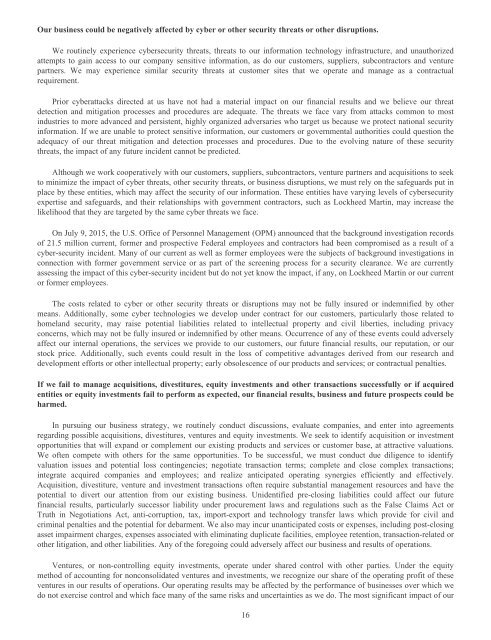LOCKHEED MARTIN CORPORATION
2015-Annual-Report
2015-Annual-Report
Create successful ePaper yourself
Turn your PDF publications into a flip-book with our unique Google optimized e-Paper software.
Our business could be negatively affected by cyber or other security threats or other disruptions.<br />
We routinely experience cybersecurity threats, threats to our information technology infrastructure, and unauthorized<br />
attempts to gain access to our company sensitive information, as do our customers, suppliers, subcontractors and venture<br />
partners. We may experience similar security threats at customer sites that we operate and manage as a contractual<br />
requirement.<br />
Prior cyberattacks directed at us have not had a material impact on our financial results and we believe our threat<br />
detection and mitigation processes and procedures are adequate. The threats we face vary from attacks common to most<br />
industries to more advanced and persistent, highly organized adversaries who target us because we protect national security<br />
information. If we are unable to protect sensitive information, our customers or governmental authorities could question the<br />
adequacy of our threat mitigation and detection processes and procedures. Due to the evolving nature of these security<br />
threats, the impact of any future incident cannot be predicted.<br />
Although we work cooperatively with our customers, suppliers, subcontractors, venture partners and acquisitions to seek<br />
to minimize the impact of cyber threats, other security threats, or business disruptions, we must rely on the safeguards put in<br />
place by these entities, which may affect the security of our information. These entities have varying levels of cybersecurity<br />
expertise and safeguards, and their relationships with government contractors, such as Lockheed Martin, may increase the<br />
likelihood that they are targeted by the same cyber threats we face.<br />
On July 9, 2015, the U.S. Office of Personnel Management (OPM) announced that the background investigation records<br />
of 21.5 million current, former and prospective Federal employees and contractors had been compromised as a result of a<br />
cyber-security incident. Many of our current as well as former employees were the subjects of background investigations in<br />
connection with former government service or as part of the screening process for a security clearance. We are currently<br />
assessing the impact of this cyber-security incident but do not yet know the impact, if any, on Lockheed Martin or our current<br />
or former employees.<br />
The costs related to cyber or other security threats or disruptions may not be fully insured or indemnified by other<br />
means. Additionally, some cyber technologies we develop under contract for our customers, particularly those related to<br />
homeland security, may raise potential liabilities related to intellectual property and civil liberties, including privacy<br />
concerns, which may not be fully insured or indemnified by other means. Occurrence of any of these events could adversely<br />
affect our internal operations, the services we provide to our customers, our future financial results, our reputation, or our<br />
stock price. Additionally, such events could result in the loss of competitive advantages derived from our research and<br />
development efforts or other intellectual property; early obsolescence of our products and services; or contractual penalties.<br />
If we fail to manage acquisitions, divestitures, equity investments and other transactions successfully or if acquired<br />
entities or equity investments fail to perform as expected, our financial results, business and future prospects could be<br />
harmed.<br />
In pursuing our business strategy, we routinely conduct discussions, evaluate companies, and enter into agreements<br />
regarding possible acquisitions, divestitures, ventures and equity investments. We seek to identify acquisition or investment<br />
opportunities that will expand or complement our existing products and services or customer base, at attractive valuations.<br />
We often compete with others for the same opportunities. To be successful, we must conduct due diligence to identify<br />
valuation issues and potential loss contingencies; negotiate transaction terms; complete and close complex transactions;<br />
integrate acquired companies and employees; and realize anticipated operating synergies efficiently and effectively.<br />
Acquisition, divestiture, venture and investment transactions often require substantial management resources and have the<br />
potential to divert our attention from our existing business. Unidentified pre-closing liabilities could affect our future<br />
financial results, particularly successor liability under procurement laws and regulations such as the False Claims Act or<br />
Truth in Negotiations Act, anti-corruption, tax, import-export and technology transfer laws which provide for civil and<br />
criminal penalties and the potential for debarment. We also may incur unanticipated costs or expenses, including post-closing<br />
asset impairment charges, expenses associated with eliminating duplicate facilities, employee retention, transaction-related or<br />
other litigation, and other liabilities. Any of the foregoing could adversely affect our business and results of operations.<br />
Ventures, or non-controlling equity investments, operate under shared control with other parties. Under the equity<br />
method of accounting for nonconsolidated ventures and investments, we recognize our share of the operating profit of these<br />
ventures in our results of operations. Our operating results may be affected by the performance of businesses over which we<br />
do not exercise control and which face many of the same risks and uncertainties as we do. The most significant impact of our<br />
16


